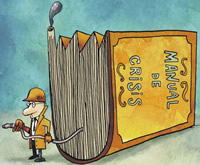 A few weeks ago, the cover of Caras y Caretas magazine caught my attention (it was in November or December, I can't remember exactly). The title was "When the exit is not Ezeiza." Why? Because once again we're facing an economic crisis, except this time the rest of the world is just like us (or much worse).
A few weeks ago, the cover of Caras y Caretas magazine caught my attention (it was in November or December, I can't remember exactly). The title was "When the exit is not Ezeiza." Why? Because once again we're facing an economic crisis, except this time the rest of the world is just like us (or much worse).
Where is the way out then when we can no longer take a plane thinking that things are better outside?
In the organizational sphere, since the much-vaunted globalization affects us all, the crisis is also global. In this context, it's surely time to revisit traditional responses (those that come first and almost naturally to us, those we know by heart from countless repetitions) because, to paraphrase Einstein, if we seek different results, we can't always do the same thing.
We are confident then that, in the sphere of organizations, this is an excellent time to Look Inward.
Two clues:
1. Develop ways to retain people in the companyThose people who took a lot of time and effort to recruit and develop. Those same people who responded excellently in times of excess demand. And at the risk of sounding harsh, I'd like to invite you to think: let's suppose we made an investment in equipment, and that investment entailed a great deal of effort in terms of research, installation, the time needed to get it working at full capacity, etc. Would we be willing to let it go because sales or orders dropped? I'll give you an answer in advance: definitely NOT! We will do what is necessary to retain and maintain it until it's working again. Why then do some companies get rid of people so quickly without evaluating the investment made in their development and the investment they will need to make again when demand grows again?
2. Implement continuous improvement systemsYes! This is the time. Since we're not overworked, it's time to train and implement management methodologies that allow us to improve costs and productivity, eliminate losses, develop and strengthen self-managed work teams, reduce customer delivery times, etc. This way, when the new period of prosperity begins, we'll be better positioned to compete in a world desperate to market its products and services.
On a personal level
We could extrapolate what we said before: crises are opportunities. As you say. Raúl in our note 1: “Twenty years ago, no one would have considered a career change as positive, and even less so if the reason or trigger was a separation. Today, society has gradually begun to view these processes without shame and, knowing that they are natural in a changing world, is gradually learning to capitalize on their full potential to achieve a better future for those who choose to live them intelligently.”
Consequently, we can also take into account some central themes:
1. Plan our careerWhat do we want for our personal/professional future? How can we achieve it? Do we have the energy to step out of our comfort zone and take on new challenges?
2. Define small steps: The best way to eat an elephant is one piece at a time. Crises and changes often seem like enormous elephants that are impossible to digest, but opportunities undoubtedly lurk behind them, and we just need to be prepared to seize them.
The new year is always a time for renewed commitments. Both personally and organizationally, we believe it's time to try new responses to these challenges. Because, as Eduardo Galeano says: "Although we cannot predict the future, we do, at least, have the right to imagine what we want it to be."
See you next time
